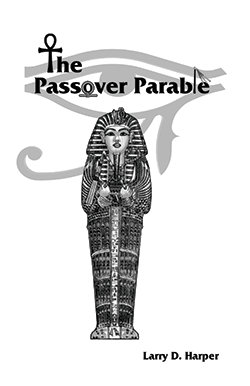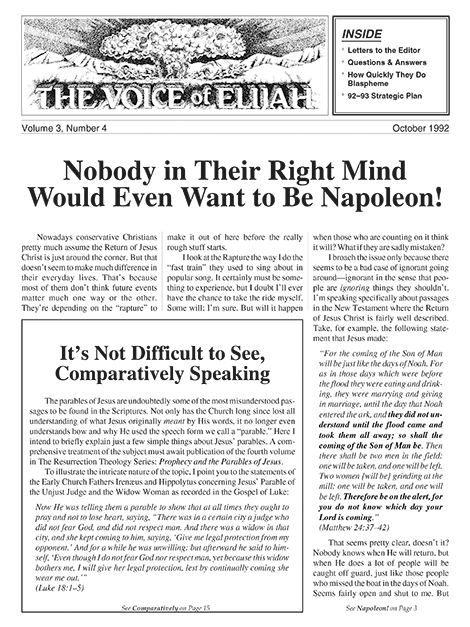Parables Tell Us How One Thing Is Like Another
Most people assume that Jesus Christ spoke in parables to teach moral lessons. That is not true. The English word parable comes from the Greek word paraboles, which simply means “comparison.” That Greek word is best known for its use in the Scriptures, where it most often refers to the parables of Jesus Christ.
The Truth is, in the time of Christ, the Greek word paraboles was used to refer to any comparison between two things. Therefore, every one of Jesus’ parables is a descriptive comparison put in the form of a brief story that points out how two entirely different things are alike. That is why Jesus began many of His parables by saying, “the kingdom of God is like” this or “the kingdom of heaven may be compared to” that:
Therefore He was saying, “What is the kingdom of God like, and to what shall I compare it? It is like a mustard seed, which a man took and threw into his own garden; and it grew and became a tree; and the birds of the air nested in its branches.” And again He said, “To what shall I compare the kingdom of God? It is like leaven, which a woman took and hid in three pecks of meal, until it was all leavened.”
(Luke 13:18–21) —NASB
The Key to Understanding Parables
The purpose of the parables of Jesus Christ as well as the parables of Moses and all the other Prophets of Israel is to compare the unknown to something that is known. Parables (comparisons) are absolutely essential to an accurate understanding of the Scriptures because they provide the only means by which finite humans existing in a visible physical realm can understand an infinite God Who exists in an invisible spiritual realm. But one must always keep in mind the fact that parables do not depict what some unknown reality actually is; they only describe what it is like, by comparing it to something that is already known.
Understanding the parables of Scripture requires a basic knowledge of two things:
- The meaning of each parabolic image (for example, a mustard seed, a tree, leaven, etc.)—that is, what it represents—and
- The significance of the comparison being made between those two things—that is, why the comparison is being made.
Believe it or not, the key to understanding the parables of Scripture is found in the Hebrew Scriptures. That’s because every parable of Moses, the Prophets of Israel, and Jesus Christ is based on a parabolic image and a Hebrew idiom whose meaning and significance are explained somewhere in the prophecies of Moses or the other Prophets of Israel.
Related Information

The Passover Parable
Jesus said the writings of Moses, the Prophets, and the Psalms—that is, the entirety of the Hebrew Scriptures—are all about Him (Luke 24:27, 44; John 5:46). Yet few today can find any reference to Jesus Christ in the Hebrew Scriptures because they don’t understand that God has used parables since the time of Moses to speak concerning His Son. The Passover Parable is at the heart of God’s message concerning His Firstborn Son, Jesus Christ. That message can be seen in the carefully orchestrated parabolic pantomime that God directed Corporate Israel, His Firstborn Son (Ex. 4:22), to enact during the Exodus of the sons of Israel from Egypt.

Nobody in Their Right Mind Would Even Want to Be Napoleon!
It is generally accepted that a perfectly rational person is one whose state of mind accurately reflects his state of being. The deluded fellow who believes he is Jesus Christ is generally accepted as being insane. Where does that leave all those people today who believe Satan’s lies? They insist everyone—themselves above all—is special to God (their deluded state of mind). Like a totally paranoid individual, they reject the Truth about their wretched spiritual condition (their actual state of being). This article makes the point that sanity, above all else, requires a knowledge of and belief in the Truth rather than a fantasy.

If You Plan to Reap What You Sow, You Had Better Watch What You Plant
This is the first in a series of articles that explain the meaning of Jesus’ parables in terms of the parabolic imagery and Hebrew idioms the Prophets used. It continues the undertaking begun in the “Questions & Answers” column of the January 1998 issue. It explains what Jesus was talking about in the Parable of the Sower and how that relates to the fact that He is Corporate Israel—in and of Himself the Kingdom of God.
The Truth is Available
Check Out the Online Library
Browse through our library of eBooks and newsletters—absolutely free!
Start Reading Now